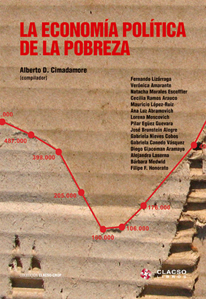La economía política de la pobreza

Alberto D. CIMADAMORE (ed.). CLACSO-CROP Series. CLACSO. Buenos Aires, March 2008.
Poverty is produced and reproduced within social relations historically conditioned by the market and the state. This book looks at poverty from the perspective of political economy understood as a way of analyzing social relations by studying their complementary interactions. Both state and market are two different forms – for some authors‟ contradictory – of social organization which interact in a cyclical pattern. The theories, ideologies and doctrines conceptualize and establish, in a normative manner, the roles of both structures with respect to modes of distribution of resources. These models contribute to give form and content to the political and social economies which conditions poverty. Latin America is the scene where neo-liberalism identified the self-regulated market as the best mechanism to maximize efficiency in distributing resources. The result of the implementation of this model is evident: about 40% of people in Latin America lives in conditions of poverty and deprivation.
INDEX
Alberto D. Cimadamore y Fernando Lizárraga
Introducción a la economía política de la pobreza | 11
PARTE I
Verónica Amarante
Crecimiento económico, distribución del ingreso y conflicto social: el caso de América Latina | 31
Natacha Morales Escoffier
Un rompecabezas no resuelto. La Estrategia Boliviana de Reducción de la Pobreza y el rol del Estado | 67
Cecilia Ramos Arauco
La retórica de las instituciones internacionales de financiamiento y la reducción de la pobreza en Bolivia | 115
Mauricio López-Ruiz
Historia reciente del discurso de la política social antipobreza en Costa Rica | 169
Ana Luz Abramovich
Emprendimientos productivos de la economía social en Argentina: funcionamiento y potencialidades | 221
Lorena Moscovich
Estado y sociedad civil en el Gran Buenos Aires. Cambio y tensiones en las nuevas relaciones de gobierno local | 261
Pilar Egüez Guevara
Mujeres en el trueque en Argentina: las implicancias de su participación | 297
PARTE II
José Brunstein Alegre
Tendencias de las políticas públicas y la pobreza rural campesina en Paraguay | 339
Gabriela Nieves Cobos
Desarrollo local y pobreza: desigualdades socioterritoriales | 369
Gabriela Canedo Vásquez
Una conquista indígena. Reconocimiento de municipios por “usos y costumbres” en Oaxaca (México) | 401
Diego Giacoman Aramayo
Reproducción de las estructuras de poder: discursos contra la pobreza y el narcotráfico en Bolivia | 427
Alejandra Laserna
Pobreza y salud: mercado laboral, condiciones de hábitat y salud en Bolivia | 465
Bárbara Medwid
Mitos y realidades de la pobreza y el Mercosur. El caso de la industria azucarera en Tucumán | 495
Filipe F. Honorato
Riqueza e exclusão: o impacto dos royalties do petróleo na expansão da miséria na Região Norte Fluminense | 537







